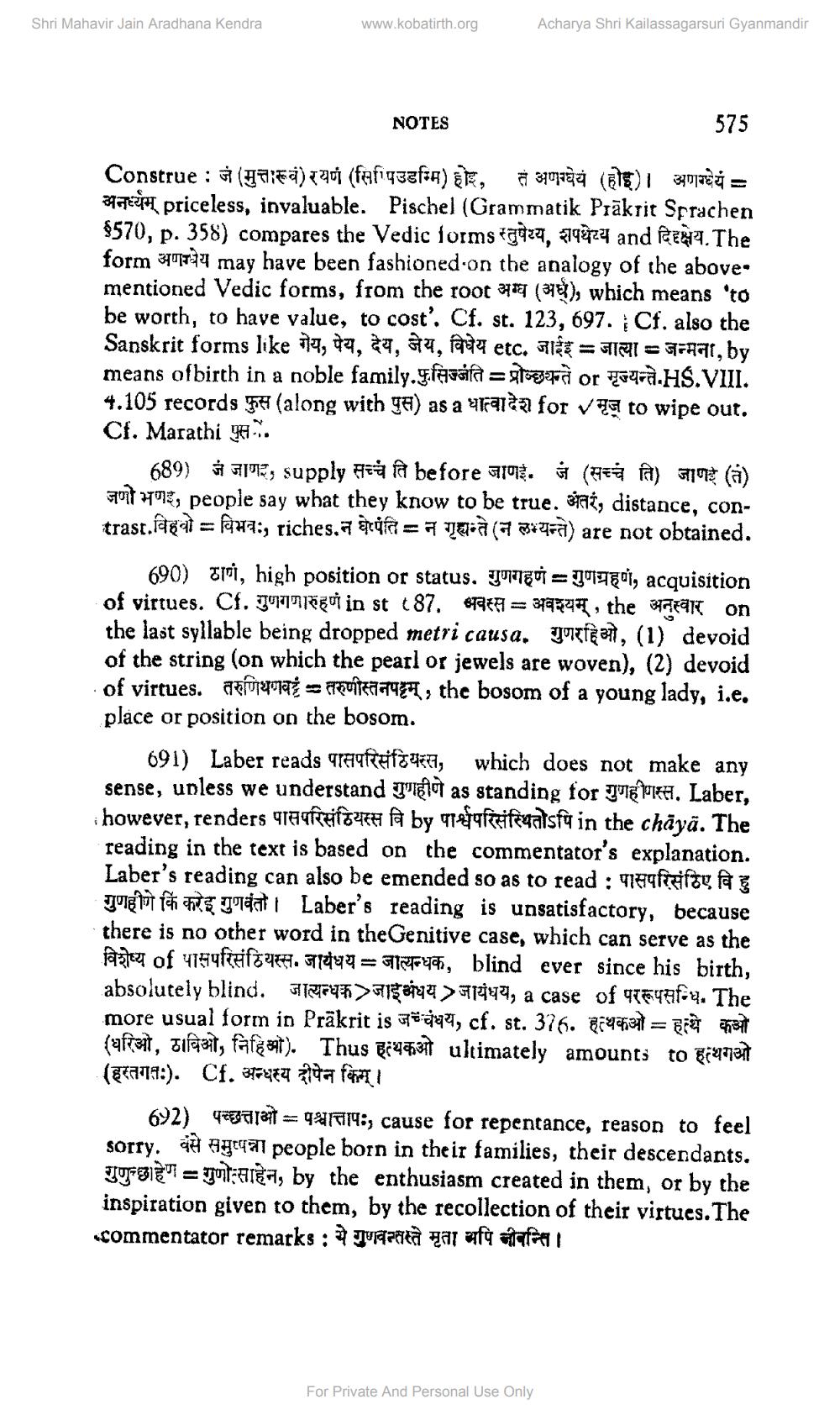________________
Shri Mahavir Jain Aradhana Kendra
www.kobatirth.org
Acharya Shri Kailassagarsuri Gyanmandir
NOTES
575
Construe : जं (मुत्तारूव) रयणं (सिपिउडम्मि) होइ, तं अणग्धेयं (होइ)। अणग्ध्यं = अनय॑म् priceless, invaluable. Pischel (Grammatik Prakrit Sprachen $570, p. 358) compares the Vedic forms gaza, 799124 and RENA. The form 377734 may have been fashioned on the analogy of the abovementioned Vedic forms, from the root 389 (378), which means 'to be worth, to have value, to cost'. Cf. st. 123, 697. Cf. also the Sanskrit forms like गेय, पेय, देय, जेय, विधेय etc. जाईइ = जात्या = जन्मना, by means ofbirth in a noble family.फुसिज्जंति =प्रोज्छयन्ते or मृज्यन्ते.HS.VIII. 4.105 records फुस (along with पुस) as a धात्वादेश for / मृज to wipe out. Cf. Marathi पुस...
689) जं जाणा, supply सच्चं ति before जाणई. जं (सच्चं ति) जाणडे (त) जणो भणई, people say what they know to be true. अंतरं, distance, contrast.विहवो = विभवः, riches.न घेप्पति = न गृह्यन्ते (न लभ्यन्ते) are not obtained.
690) ठाणं, high position or status. गुणगणं = गुणग्रहणं, acquisition of virtues. Cf. गुणगणारुणं in st 187. अवस्स = अवश्यम् , the अनुस्वार on the last syllable being dropped metri causa. गुणरहिओ, (1) devoid of the string (on which the pearl or jewels are woven), (2) devoid of virtues. तरुणियणवट्ट - तरुणीस्तनपट्टम् , the bosom of a young lady, i.e. place or position on the bosom.
691) Laber reads पासपरिसंठियरस, which does not make any sense, unless we understand गुणहीणे as standing for गुणहीणस्त. Laber, however, renders पासपरिसंठियस्स वि by पार्श्वपरिसंस्थितोऽपि in the chāyā. The reading in the text is based on the commentator's explanation. Laber's reading can also be emended so as to read : पासपरिसंठिए वि हु गुणहीणे किं करेइ गुणवंती। Laber's reading is unsatisfactory, because there is no other word in theGenitive case, which can serve as the विशेष्य of पासपरिसंठियस्स. जायधय = जात्यन्धक, blind ever since his birth, absolutely blind. जात्यन्धक>जाइअंधय > जायंधय, a case of पररूपसन्धि. The
more usual form in Prakrit is जच्चंधय, cf. st. 376. हत्थकओ = हत्थे कओ (धरिओ, ठाविओ, निहिओ). Thus हत्थकओ ultimately amounts to हत्थगओं (हस्तगतः). Cf. अन्धस्य दीपेन किम् ।
602) पच्छत्ताओ= पश्चात्तापः, cause for repentance, reason to feel sorry. वसे समुप्पन्ना people born in their families, their descendants. गुणुन्छाहेण = गुणोत्साहन, by the enthusiasm created in them, or by the inspiration given to them, by the recollection of their virtues. The ecommentator remarks : ये गुणवन्तस्ते मृता अपि जीवन्ति।
For Private And Personal Use Only




